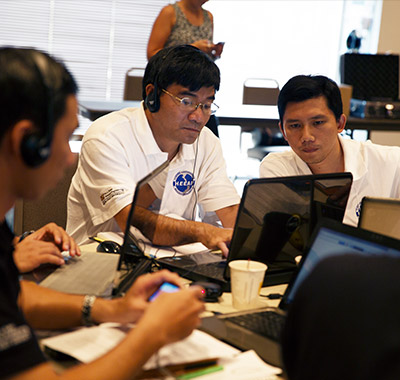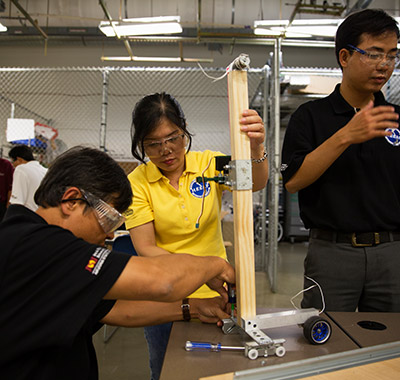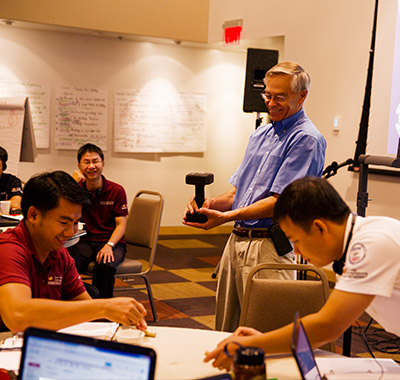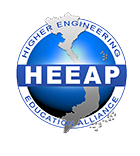Programs
UNIVERSITY TRAINING
The six week training program for University based faculty will be instructed by a core group of faculty from ASU, led by Dr. David Benson. In addition to the core faculty, content experts from ASU's Main Campus and industry leaders will be invited to lead sessions and provide workshops. Vietnamese faculty will learn from a network of mentor faculty within their specific topic areas and across disciplines. Intel and other industry leaders will provide models of how they collaborate with U.S. schools in curriculum design, research, and student projects to assure that university graduates are work-ready. Vietnamese faculty tour and observe labs and learn methodologies of how to integrate labs and applied research programs into the classroom.

Week 1: New Instructional Methods for Engineering Instruction
Learn applied teaching strategies and approaches to advance the engineering curriculum through innovative instructional methods.
-
Project Based learning
-
Active Learning
-
ABET Alignment of Curriculum
-
Drivers for Change
-
Establishing Relevance
-
Integrated Curriculum
-
Adapting to Learning Styles
-
Problem-based Instruction
-
Showing Concern for Students
-
Integrating Applied Soft Skills
Week 2: Instructional Assessment and Evaluation
Learn applied teaching strategies and approaches to advance the engineering curriculum through innovative instructional methods. Describe process for assessing student learning.
-
Write measureable, course-level learning outcomes
-
Critique course-level learning outcomes
-
Integrate learning outcomes into a course syllabus
-
Link appropriate teaching strategies with learning outcomes
-
Match appropriate assessment measures with learning outcomes
-
Describe purpose of project evaluation
-
Describe process of project evaluation
-
Describe formative and summative evaluation approaches and their uses
-
Identify components of basic project evaluation plan
-
Write clear and measurable project objectives
-
Link appropriate evaluation measures with evaluation questions and project objectives
-
Design basic evaluation plan for HEEAP project
Week 3: English and Communication Skills for Engineers
Advance English competencies and learn methods and pedagogy to integrate strong presentations, teaching techniques, and technical reading and comprehension.
-
Audience Analysis
-
Organization of ideas and preparing the body of a speech
-
Evidence – Presenting facts and statistics in a meaningful manner
-
Introductions and Conclusions
-
Visual aids and multimedia presentations
-
Delivery skills and technical presentations
-
Reducing communication apprehension
Week 4: Developing Strong Experiments and Applied Analytical Thinking
Develop a strong mathematical foundation to design engineering experiments and analyze and interpret outcomes.
-
Demonstrate how sequential experimentation is used in building knowledge and understanding of how complex systems work.
-
Show how statistical and process-oriented thinking can guide the experimental planning process to produce the most effective experimental strategy.
-
Teach the fundamental concepts and methodologies of Design of Experiments (DOX) in a straightforward manner, allowing participants to master the techniques.
-
Demonstrate how most of the major software packages (Minitab, JMP, Design-Expert) can facilitate effective implementation of experiment design through applied labs and analysis of "real" data.
Week 5: Advanced Instructional Approaches
Design multidisciplinary curriculum to prepare students to solve complex engineering problems. Learn the principles, applications and importance of problem analysis and emotional intelligence for faculty as academic leaders.
-
Adaptation to Various Learning Styles
-
Multidisciplinary Topic Organization
-
Effective Teaming
Week 6: Integrating Applied Project Experiences across the Curriculum
Adapt project oriented approaches to instruction demonstrating application of new knowledge and achievement of learning outcomes.
-
Developing Team-based Student Project Approaches
-
How to Design and Align Labs to Learning Outcomes (Tektronix and Siemens PLM present?)
-
Methods and Approaches from Freshmen to Senior Design Capstones
-
Models and Solutions to Integrate and Manage Large Class Sections
-
Audit and Monitor Methods at ASU (E-Space, Poly Teaching Studios, EPICS, Global Senior Design leveraging distance learning, ABET Senior Design Model, Technology and Social Entrepreneurship, other)
-
Classroom and Lab Audits/Faculty and Student Interviews
University Training Program - initial defined criteria include:
- Nominated by Dean of Engineering and approved by the Rector. Ph.D. holders preferred.
- Proficiency in English comprehension, writing and speaking.
- Faculty proficiency will be tested during the interview and application process.
- Research and instruction within a defined topic area in Electrical, Thermal, Mechanical Engineering.
- ASU will make efforts to recruit participation by woman and minorities in each HEEAP program to support diversity efforts in engineering.
VOCATIONAL TRAINING
The four week training program for vocational college based faculty will be instructed by a core group of faculty from ASU who also lead the instructional component in HEEAP. In addition to the core faculty, content experts from ASUs Polytechnic Campus, local Community Colleges and industry will be invited to lead sessions and provide workshops. Vietnamese faculty will learn from a network of mentor faculty within their specific topic areas and across disciplines. Intel and other industry leaders will provide models of how they collaborate with U.S. schools in curriculum design, research, and student projects to assure that vocational education graduates are work-ready. Vietnamese faculty tour and observe labs and learn methodologies of how to integrate labs and applied research programs into the classroom.

Week 1: Technical English and Communication
Advance English competencies and learn methods and pedagogy to integrate strong presentations, teaching techniques, and technical reading and comprehension.
-
Audience Analysis
-
Organization of ideas and preparing the body of a speech
-
Evidence – Presenting technical material in a meaningful manner
-
Introductions and Conclusions
-
Visual aids and multimedia presentations
-
Delivery skills and technical presentations
-
Reducing communication apprehension
Week 2: New Instructional Methods for Engineering Instruction
Learn applied teaching strategies and approaches to advance the engineering curriculum through innovative instructional methods.
-
Project Based learning
-
Active Learning
-
Drivers for Change
-
Establishing Relevance
-
Integrated Curriculum
-
Adapting to Learning Styles
-
Problem-based Instruction
-
Showing Concern for Students
-
Integrating Applied Soft Skill
Week 3: Instructional Design, Assessment and Evaluation
Design multidisciplinary curriculum to prepare students to solve complex engineering problems.
-
Describe process for assessing student learning
-
Write measureable, course-level learning outcomes
-
Critique course-level learning outcomes
-
Integrate learning outcomes into a course syllabus
-
Link appropriate teaching strategies with learning outcomes
-
Match appropriate assessment measures with learning outcomes
-
Describe purpose of project evaluation
-
Describe process of project evaluation
-
Describe formative and summative evaluation approaches and their uses
-
Identify components of basic project evaluation plan
-
Write clear and measurable project objectives
-
Link appropriate evaluation measures with evaluation questions and project objectives
-
Design basic evaluation plan for HEEAP project
Week 4: Integrating Applied Project Experiences across the Curriculum
Adapt project oriented approaches to instruction demonstrating application of new knowledge and achievement of learning outcomes.
-
Developing Team-based Student Project Approaches
-
How to Design and Align Labs to Learning Outcomes (Tektronix and Siemens PLM present?)
-
Methods and Approaches from Freshmen to Senior Design Capstones
-
Models and Solutions to Integrate and Manage Large Class Sections
-
Audit and Monitor Methods at ASU (Poly Teaching Studios, EPICS, Global Senior Design leveraging distance learning, ABET Senior Design Model, Technology and Social Entrepreneurship, other)
-
Classroom and Lab Audits/Faculty and Student Interviews
- Faculty nominated by their Dean and approved by the Rector.
- Ph.D. holders preferred, but Masters holders will be accepted.
- Proficiency in English speaking and writing is preferred.
- Research and instruction with Electronics, Manufacturing/Industrial Technology Operations, and Materials Technology Engineering.
- College partners will make efforts to recruit and nominate women in each program to support diversity efforts in vocational programs. There will be an annual goal of 25% female faculty nominated by each Vocational partner.
VOCATIONAL AND UNIVERSITY LEADERSHIP AND INNOVATION INSTITUTE
The Vocational and University Leadership and Innovation Institute (VULII) provides educational capacity-building and training workshops and support for multiple levels within the Vietnamese educational system, ranging from ministry officials and university rectors to mid-level administrators, academic and professional staff and engineering program faculty leaders who are preparing the next generation of the engineering workforce. Strategic planning and implementation at the institutional level requires significant change within all relevant parts of the organization, so VULII focuses on multiple levels of the various Ministries and academic institutions.


